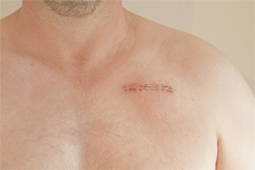A More Elastic, Conductive Bioactive Hybrid Hydrogel for Medical Implant Devices
TheTechnology
The technology is a bioactive hybrid conductive hybrid hydrogel (BPCPH) for applications in medical implant devices where a soft electrically active coating is required. The conductive hydrogel is a softer, more elastic material than conducting polymers or metals which are currently used to interface with biological tissue. The major application for BPCPH is in the medical electrodes industry (research and commercial) where a softer interface may reduce scar tissue formation and increase the life time of effective recordings and stimulations.
BPCPH may also be applied in electrically controlled drug or gene delivery by loading the material with relevant signalling molecules. This softer material will minimise tissue damage (both in vitro and in vivo) while providing a low impedance interface.
No existing technology has comparable properties, being biocompatible, robust, electro-active, and similar in effective stiffness to biological tissues.
Business Opportunity
Existing coating technologies for implantable electrodes are generally inadequate due to compromised mechanical and electrical properties. Existing materials commonly leave unwanted scar tissue around the tissue interface which further reduces the effectiveness of the electrode. BPCPH fulfils the requirement for improved materials/coatings for implantable electrodes.
Key Benefits
- Reduced scar tissue
- Softer, more elastic interface
- Drug delivery vehicle
|
|

|
The Team
The technology was developed by a multidisciplinary group of researchers from the UNSW Graduate School of Biomedical Engineering lead by Dr Rylie Green and Professor Laura Poole-Warren.
Investment Opportunity
NSi is seeking licensees to develop industry-specific applications the bioactive hybrid conducting polymer-hydrogel technology in a range of jurisdictions and fields of use.
A PDF version of this opportunity can be found: here